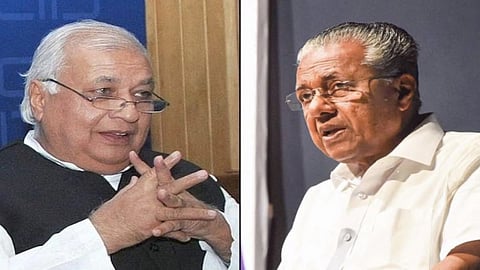

Malappuram (Ker) | Kerala Governor Arif Mohammed Khan's decision to refer seven pending bills for presidential assent -- as the Supreme Court considers the government's plea over Raj bhavan's inordinate delay in clearing legislation -- came under severe criticism from Chief Minister Pinarayi Vijayan on Wednesday.
The chief minister said it raised doubts about whether the governor was according due respect to the Supreme court.
Responding to a query from the media on this issue, the chief minister said that the Supreme Court, while considering the state government's plea, had referred to its verdict on a similar matter from Punjab -- in which it said that governors cannot take the liberty to keep bills pending indefinitely without any action.
The CM charged that Khan's reaction indicated his displeasure over the apex court's remarks.
"It is natural to have doubts about whether the governor approached the Supreme Court with due respect," Vijayan said, adding that he would say no more as the matter is pending before court.
Khan on Tuesday approved one of eight pending bills passed a while ago by the state legislative assembly.
While the governor gave his assent to the significant Public Health Bill, he has reserved seven bills, including the controversial University Amendment Bill, for presidential assent, Raj Bhavan said on Tuesday.
On November 24, a bench comprising Chief Justice D Y Chandrachud and Justices J B Pardiwala and Manoj Misra heard the plea of the Kerala government accusing the governor of not granting assent to several bills cleared by the state assembly.
The Supreme Court then had asked the Kerala Governor's additional chief secretary to refer to its recent verdict in Punjab's case, where it held that governors cannot "thwart the normal course of lawmaking".
While deciding on the Punjab government's plea against Governor Banwarilal Purohit, the top court had held that governors cannot take the liberty to keep bills pending indefinitely without any action.
The verdict said if the governor decides to withhold assent to a bill, then he has to return the bill to the legislature for reconsideration.
It also said that the unelected "Head of the State" is entrusted with constitutional powers but that cannot be used to thwart the normal course of lawmaking by state legislatures.